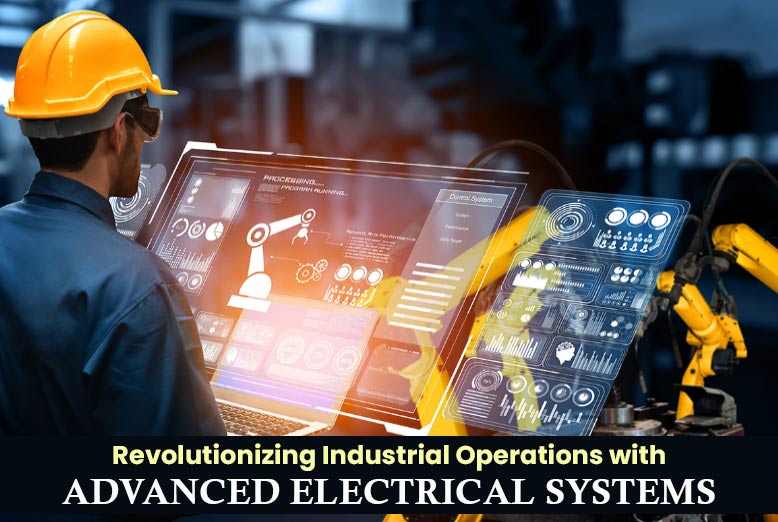In the modern industrial landscape, the efficiency and effectiveness of operations hinge significantly on the quality and sophistication of electrical systems. As industries evolve and embrace new technologies, the need for advanced electrical systems has become more pronounced. These systems not only power machinery and equipment but also play a crucial role in enhancing productivity, safety, and sustainability. In this blog, we explore how advanced electrical systems are revolutionizing industrial operations and paving the way for future innovations.
The Evolution of Electrical Systems in Industry
Traditionally, industrial electrical systems were primarily focused on primary power distribution and control. However, with the advent of automation, smart technologies, and the increasing complexity of manufacturing processes, the role of these systems has expanded significantly. Modern electrical systems now integrate various components and technologies designed to optimize every aspect of industrial operations. In my expert opinion, this evolution underscores the importance of adopting advanced electrical solutions, such as intelligent LV switchboards, to stay competitive and efficient in today’s industrial landscape.
Key Innovations in Advanced Electrical Systems:
- Automation and Control Integration: Advanced electrical systems are increasingly incorporating automation and sophisticated control mechanisms. These include programmable logic controllers (PLCs) and distributed control systems (DCS), which provide precise control over industrial processes. By automating complex tasks and enabling real-time monitoring and adjustments, these systems reduce human error, enhance operational efficiency, and improve product quality.
- Smart Technologies and IoT: Integrating smart technologies and the Internet of Things (IoT) transforms industrial electrical systems. Sensors, actuators, and connected devices collect and transmit data, allowing for detailed monitoring and analysis. This data-driven approach enables predictive maintenance, energy management, and process optimization, which are critical for reducing downtime and operational costs. Additionally, integrating intelligent LV switchboards ensures seamless communication and control within the electrical infrastructure, further enhancing efficiency and reliability.
- Energy Efficiency and Sustainability: As industries face increasing pressure to reduce their carbon footprint, advanced electrical systems are being designed with energy efficiency in mind. Innovations such as variable frequency drives (VFDs), energy-efficient transformers, and renewable energy integration are helping industries minimize energy consumption. Additionally, these systems can incorporate energy storage solutions, such as batteries, to store excess energy and improve power stability.
The Impact of Advanced Electrical Systems on Industrial Operations
- Enhanced Productivity: By streamlining operations and reducing the need for manual intervention, advanced electrical systems significantly enhance productivity. Automation allows for faster production cycles, while real-time data and analytics enable quick decision-making and process adjustments. This leads to higher output and better utilization of resources.
- Improved Safety: Safety is a paramount concern in industrial settings. Advanced electrical systems contribute to safer operations through features such as fault detection, overload protection, and automated shutdowns. These systems can also monitor environmental conditions and equipment status, providing early warnings of potential issues and preventing accidents.
- Scalability and Flexibility: The modular nature of modern electrical systems allows industries to scale and adapt their infrastructure as needed. Whether expanding production lines, integrating new technologies, or adjusting to market demands, these systems offer the flexibility to make changes without extensive downtime or costly overhauls.
The Future of Industrial Electrical Systems
As technology continues to evolve, the future of industrial electrical systems looks promising. Innovations in artificial intelligence, machine learning, and 5G connectivity are expected to further enhance the capabilities of these systems. AI-driven analytics will enable even more sophisticated predictive maintenance and optimization strategies, while improved connectivity will facilitate faster and more reliable data transmission.
Industries are also likely to see increased adoption of sustainable practices, driven by advancements in renewable energy technologies and stricter environmental regulations. Advanced electrical systems will play a crucial role in supporting these initiatives, helping industries achieve greater energy efficiency and sustainability.
Conclusion
Advanced electrical systems are revolutionizing industrial operations by providing enhanced automation, smart technology integration, and energy efficiency. As industries continue to face new challenges and opportunities, these systems will be integral to achieving higher productivity, safety, and sustainability. Embracing advanced electrical systems is not just a step forward for industrial operations, it is a leap towards a more innovative and sustainable future.
Also Read: Industrial Storage Solutions: Maximizing Space Efficiency




















